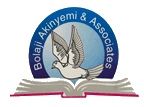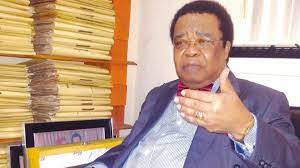LAGOS – Former Minister of Foreign Affairs, Professor Bolaji Akinyemi, has called for committed and visionary leaders who can focus attention on how to use Nigeria’s resources to develop and attend to the needs of the citizens.
Prof. Akinyemi made the call while speaking as chairman of book launch, titled: “The Pan-African Pantheon: Prophets, Poets, and Philosophers,” organized by the Nigerian Institute of International Affairs (NIIA) and the Center for Advancement of Scholarships (CAS), University of Pretoria, South Africa, in Lagos on Wednesday.
He said that Nigeria needs good roads, a functioning education system adding: “When you get a target, you should state how much to spend on your education in your budget, you must not go below that.”
Speaking on the security challenge in Nigeria, he said that a United Nations report shows that the country needs one million and two hundred and fifty thousand policemen considering its population, but lamented that unfortunately, “We have only 350,000 policemen. You wonder why we have security problems in Nigeria.”
While also lamenting that Nigeria does not have enough soldiers, Akinyemi added: “You have soldiers who would have been sufficient if we do not have security problems because they will be in the barracks training for the United Nations Peace-keeping operations.
“But you have security issues now in every zone in the country. So you need more soldiers, and where will you get these soldiers?”
He recalled that during the Ibrahim Babangida administration, the national guard was established, but was dismantled by the late Gen. Sani Abacha.
He called for the restoration of the national guard as, according to him, the Nigerian Army is over-stretched, saying: “In any case, the military should not be doing roadblocks. It is the national guard that should be doing that.”
While attributing leadership failure as a hindrance to attaining Nigeria’s desired position in the global setting, Akinyemi said that Nigeria is consumed by domestic problems.
“We waste the available resources of the country. We misapply them and say that we do not have money to do the essential things. Nigeria has the highest paid senators in the world,” he added.
“If you are the biggest Black nation in the world, is the world paying attention to you? We are not paying attention to global affairs. We are being consumed by domestic problems. Remember what Nelson Mandela said until Nigeria earns the respect of the world, the Black race and Africa will not get the desired respect.”
Urging the Black race to celebrate the continent’s first generation leaders, Prof. Akinyemi added: “Without the OAU, Africa would have been engulfed in civil wars. That we have come this far in spite of what the West has done to us shows the backbone of our leaders.”
He says he wants to see the resurgence of Nigerian youths to project the ideas of pan-Africanism in the country.
On the 2023 election, he said that INEC has the capability to conduct free and fair elections if it is left alone to conduct elections.
Senior Research Fellow, Centre for the Advancement of Scholarship (CAS), University of Pretoria, South Africa, Prof, Adekeye Adebajo, who is the author, called for the need to revive pan-Africanism, adding that
“We need to do so in order to revive communism in Africa to tap into the conventional Black group.”
He said the book, which looks at Pan-Africanism historically, has a rich study of the history of Africa’s struggle to achieve political, social, economic and cultural unity over a period of 200 years.
Prof. Adele L. Jinadu, Non-Resident Fellow, Centre for Democracy and Development (CDD), Abuja, a guest speaker, while calling for the revival of pan-Africanism, said: “We must start from our own roots, respect our values, we have our own trajectory to pursue and try not to imitate the outside world; and we must unite our own brotherhood.
“Pan-Africanism says we must transcend our prejudices and see one another as children of God, as our brothers’ keepers and that it is humanity that unites us all. Racism must not be tolerated.”
source: independent.ng



